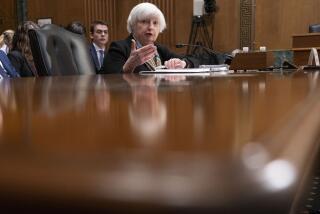Volcker Cites Risks From Weak Dollar
- Share via
WASHINGTON — Federal Reserve Chairman Paul A. Volcker warned today that the United States faces “substantial risks”--including a recession--from further reliance on a weaker dollar alone to correct the country’s huge trade deficit.
Volcker, in congressional testimony, said further sharp declines in the value of the dollar on foreign exchange markets could threaten to topple the country into a recession.
He specifically noted “warning signs” in recent weeks of a danger that the dollar might fall too far too fast.
While Volcker did not spell out those signals, world financial markets were thrown into turmoil last week when the dollar fell to record lows against the Japanese yen. Concerns that a weaker dollar would boost inflation in the United States were among the reasons cited by several major banks when they raised their prime lending rate last week for the first time in almost three years.
“Looking toward depreciation of the dollar alone to improve our trade balance would clearly pose substantial risk of renewed inflationary momentum and undermine confidence in future financial stability--developments that could jeopardize prospects for sustained economic expansion,” Volcker said in an appearance before a Senate banking subcommittee.
U.S. ‘Active Intervention’
Volcker said the desire for greater stability in foreign exchange rates was a key element underpinning an accord reached among the United States and five other major industrial countries meeting in Paris in February.
For the first time, Volcker confirmed that the United States had engaged in “active intervention in the exchange markets in recent weeks.”
Countries intervene by buying or selling currencies in large amounts as a way of influencing their price on the open market.
But Volcker noted that intervention can be of only limited use in influencing the value of the dollar and other currencies.
“Confidence in the current exchange rate levels will in the end depend upon perceptions that more fundamental policies than intervention will in fact be brought to bear,” Volcker said.
Cites Encouraging Signs
“I would argue that the problems of economic growth, balance-of-payments adjustment, protectionism and international debt are so intertwined today that a failure to deal constructively with any one of them would risk failure across the board,” Volcker said.
He said there are some encouraging signs that the U.S. trade deficit, which swelled to a record $170 billion last year, is finally beginning to shrink.
But he said any improvement will be a slow process and will need to be accompanied by further progress in Congress to reduce the huge federal budget deficit, which Volcker and others have for many years linked directly to the country’s trade problems.
“What we need now, instead of more depreciation (of the dollar), is action here and abroad to carry through on those other measures needed to support growth and adjustment--specifically, action to reduce the budget deficit here and to provide stimulus abroad,” Volcker said.
The Reagan Administration in recent months has used pressure against the dollar in an effort to force Japan and West Germany to do more to stimulate their economies and provide world markets for exports.
More to Read
Inside the business of entertainment
The Wide Shot brings you news, analysis and insights on everything from streaming wars to production — and what it all means for the future.
You may occasionally receive promotional content from the Los Angeles Times.










